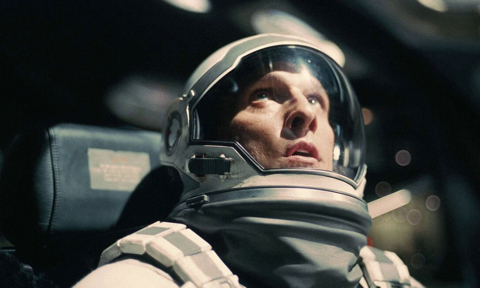
A visionary director and writer whose every release feels like a cultural reset, Christopher Nolan has come to be known as a mind-bending, creative movie genius. Since the age of 7, when he made his own short films on his father’s Super 8 camera, Nolan has been fascinated with cinema. His life is dedicated to creating worlds within worlds and keeping audiences guessing his (and his characters’) next move.
Nolan went from making low-budget independent cinema, his first film was made for $6000, to prestigious multi-million dollar studio projects, which have the entire world in a chokehold. He has undoubtedly won the audience’s trust and is one of the most distinct voices in cinema today.
Nolan seems to pour his heart and soul into every one of his films, which are somewhat miraculously released within two to three years of each other. What he’s best known for, though, is his dense plotting, which he infuses with scientific theories, twisting them in ways that viewers have to pay close attention to comprehend and follow. His upcoming film Oppenheimer looks to be yet another chapter in that legacy.
Here are 5 of Nolan’s best directorials
Memento (2000)
Nolan’s second film and first full-length feature, Memento served as inspiration for Aamir Khan’s Ghajini, which was honestly a pale imitation. This movie was a great achievement for the then 30-year-old filmmaker still trying to find his way in the film industry. The story follows Leonard (Guy Pearce), who suffers from a rare form of short-term memory loss, but somehow hasn’t forgotten that his wife was brutally raped and murdered.
Despite not remembering what happened 15 minutes ago, Leonard is on a mission to find his wife’s killer, guided by clues and notes that he leaves for himself. The darkly comedic and tragic movie is based on an incredible original short story written by Nolan’s brother, Jonathan (who also co-wrote The Prestige, The Dark Knight, and The Dark Knight Rises). Led by its cinematography, scripting, background score, and consistent suspense all the way to the end, this early Nolan film is a perfect cinematic package and very nearly his best work.
Interstellar (2014)
This movie is a beautiful and heart-wrenching adventure that takes us through time, space, and the human condition. The visuals in Nolan’s time travel film are remarkable because they’re a mix of CGI, practical sets, and real-world locations. From wormholes to distant planets with varied ecosystems, the different settings give the film an otherworldly feel.
In the movie, as planet Earth is being rendered inhabitable by a global crop blight, Professor Brand (Michael Caine), a brilliant NASA physicist, works on plans to save mankind. He aims to execute this by transporting Earth’s population to a new home via a wormhole. But first, Brand must send former NASA pilot Cooper (Matthew McConaughey), his daughter (Anne Hathaway) and a new team of researchers through the wormhole and across the galaxy to find out which of three planets could be mankind’s new home.
Playing with relativity, Stephen Hawking’s theories, and travel between dimensions, Nolan gives us this operatic and emotional epic. Despite Interstellar‘s focus on scientific concepts, this film is ultimately a delicate examination of the ineffable parts of human life that transcend scientific understanding.
The Dark Knight (2008)
The second and most successful of the director’s Batman films, The Dark Knight is the unofficial king of the cult-favourite franchise and is yet to be bettered. When the film starts, Batman (Christian Bale), Jim Gordon (Gary Oldman), and District Attorney Harvey Dent (Aaron Eckhart) have successfully driven crime to an all-time low in Gotham, giving Wayne the hope that he can retire to a happy life with lifelong love Rachel Dawes. That is until a new enemy hell bent on creating total chaos, the Joker (Heath Ledger), turns everything around.
Ledger posthumously won the Academy Award for Best Supporting Actor for this role in 2009, and his incredible performance delved into what it means to be a hero, what it means to be a villain, and how the lines get blurred in the face of chaos. As Ledger’s Joker says: “I’m an agent of chaos. Oh, and you know the thing about chaos? It’s fair.”
Inception (2010)
In a conceptual roller coaster of increasing depth, Inception is Nolan’s most popular mind-bender — making you question consciousness itself. The movie follows Dom Cobb (Leonardo DiCaprio), who has powers that allow him to steal secrets from people while they’re dreaming. His skill has made him a hot commodity in the world of corporate espionage but has also cost him everything he loves.
Cobb gets a chance at redemption when he is offered a seemingly impossible task: planting an idea in someone’s mind. If he succeeds, it will be the perfect crime, but a dangerous enemy is tracking Cobb’s every move. When the lines begin to blur between dreams and reality, some may find themselves confused or bored, while others are likely to be intrigued by the open-ended questions that Inception presents to audiences.
Dunkirk (2017)
In Dunkirk, Nolan’s first period drama and one of the best war movies ever made, he beautifully captures one of the most challenging moments of World War II. In the spring of 1940, Allied soldiers are trapped on the beaches of Dunkirk, as Nazi forces invade France using superior tactics and armament. As the battle-fatigued Allied soldiers are waiting for rescue ships to save all 400,000 of them, regular British citizens donate their boats to the cause.
Most of the men end up getting evacuated safely, and Dunkirk depicts that heroic, harrowing battle with utmost grace. The tense and emotional movie is made even better with a musical score by the spectacular Hans Zimmer and sound designer Richard King.






